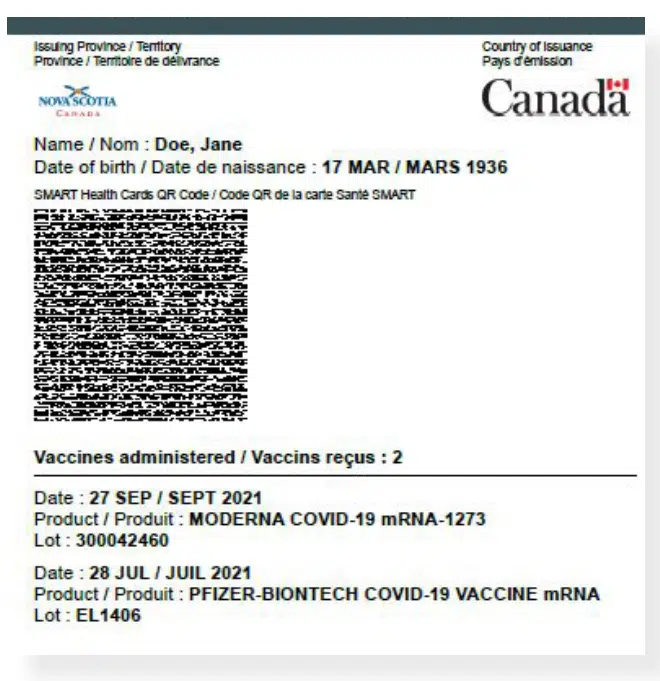It’s a greenlight for Phase 5 of our reopening plan on Monday but with a cautious approach.
While most restrictions will be lifted, some will be maintained, and border restrictions will be added for people coming to visit.
Some notable aspects of Phase 5 include:
— masks will continue to be mandatory in indoor public places
— physical distancing and gathering limits for events hosted by a recognized business or
organization will be lifted
— the informal gathering limits of 25 people indoors and 50 outdoors will remain in place
— proof of full vaccination will be required for non-essential events and activities
“The Delta variant has impacted our epidemiology. The fourth wave is taking its toll across the country and it’s now in Nova Scotia,” said Premier Tim Houston. “We can lift some restrictions with the added protection of the proof of full vaccine protocol and our high vaccination rates, but masking and limits for informal gatherings need to stay in place. We’re taking a cautious approach so we can keep moving forward, even in the midst of the fourth wave.”
Mandatory Vaccines for Health & Educational Staff
If you work in health care or the school system the province is making it mandatory you are double vaxxed. Dr. Robert Strang says these workers will need to provide proof of vaccine status in order to go to work.
- Nova Scotia Health Authority and IWK Health Centre
- Workers in long-term care facilities and home-care agencies (licensed and unlicensed)
- Public school teachers, pre-primary and other school-based staff, regional and board office staff, and those providing services in schools, including cafeteria and school bus services
- Hearing and Speech Nova Scotia
- Residential facilities and day programs funded by the Department of Community Services Disability Support Program
- Workers in facilities and those providing placements for children and youth in the care of the Minister of Community Services (excluding foster family placements)
- Paramedics, LifeFlight nurses and some other staff at EHS
- Physicians and other service providers to the above organizations; for example hairdressers and contractors
Employees who choose not to be vaccinated must participate in an education program before November 30 and if they are not fully vaccinated by that date, they will be placed on unpaid leave.
Meantime, all new staff in these sectors will need to have two doses in order to get hired.
Proof of Vaccine Status
Starting at 12:01 a.m. on October 4, proof of full vaccination will be required for people who are 12 and older to participate in discretionary, non-essential events and activities
that gather people together, such as going to restaurants, movies, sports events, theatre performances, social events and the gym.
Based on conversations with people in many sectors in the past week, some changes have been made in the list of places where proof of full vaccination will be required. For
example, proof of vaccination will not be required for general library access but will be required to participate in library programs that bring groups of people together. It will be required for designated caregivers and visitors of residents in long-term care facilities, with limited exceptions. It will apply to dining in at fast-food establishments, but not to takeout, delivery, drive-thru or food courts.
Proof of vaccination will not be required under the provincewide protocol for employees of businesses and organizations that offer these events and activities, but it will be
required for their volunteers. Businesses and organizations are encouraged to set their own vaccination policies.
Any policies should take legal and ethical implications into consideration.
People who are not fully vaccinated need to be able to access essential services
The proof of full vaccination protocol and resources for businesses and organizations where it applies are available
Border Measures
Effective at 8 a.m. on Monday, everyone coming to Nova Scotia from other Canadian provinces and territories will need to complete the Nova Scotia Safe Check-in form.
Their isolation will be based on vaccination status and testing.
People who were fully vaccinated at least 14 days before arriving do not have to isolate, but testing is recommended. People who are not fully vaccinated must isolate for at least seven days
and get two negative test results in Nova Scotia to stop isolating after seven days.
They must be lab-based tests, not rapid tests.
“Our border measures have been integral to our success in managing the pandemic to date, and we need to strengthen them right now given the fourth wave activity, particularly in the Atlantic region,” said Dr. Robert Strang, Nova Scotia’s chief medical officer of health. “The proof of full vaccination requirement will be another important tool to keep Nova Scotians safe through the fourth wave. I want to thank the businesses and organizations who have helped us implement public health measures throughout this pandemic. Please be kind when they ask you to show your proof – the law will require it, and they will have to check before you can participate in discretionary events and
activities.”









